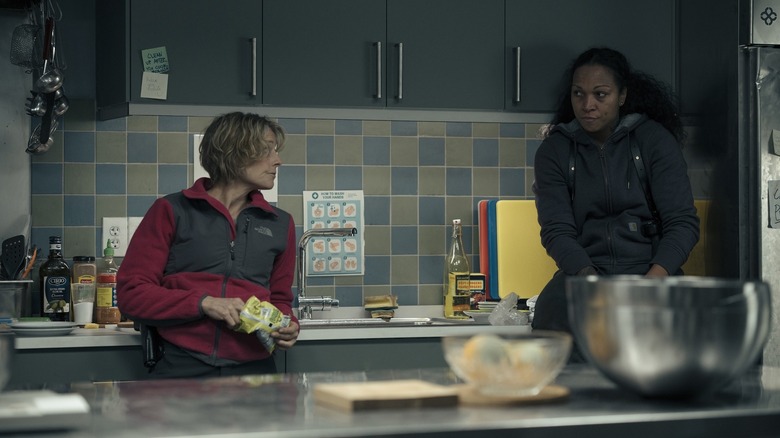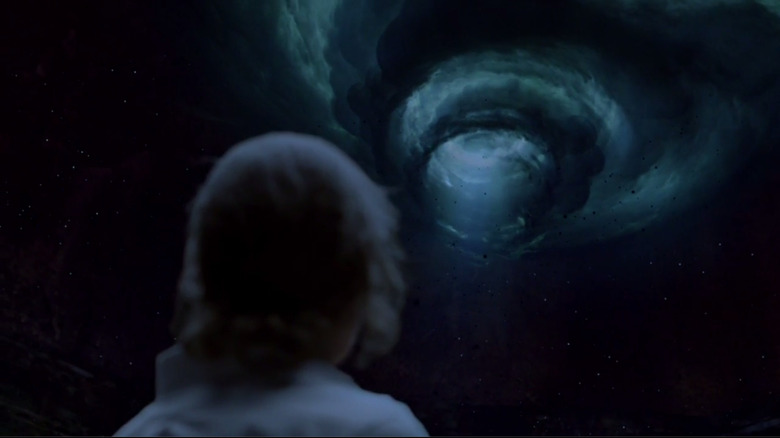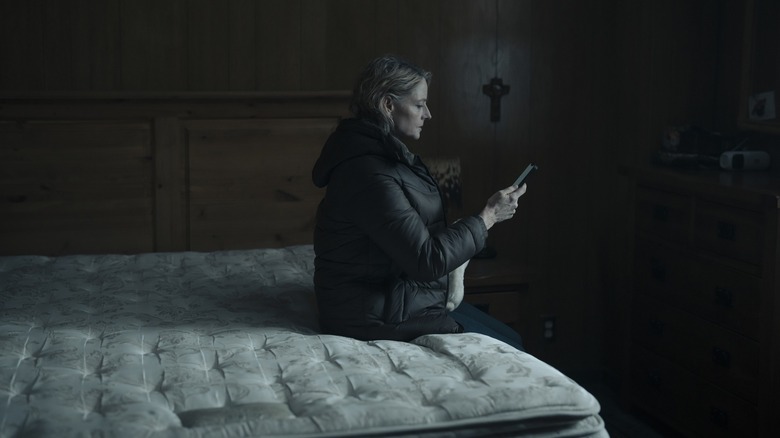Confused By The True Detective: Night Country Finale? This Season 1 Moment Is The Key
Warning: We're in the Night Country now. This article contains spoilers for the "True Detective" season 4 finale.
All throughout this latest season of "True Detective," writer/director Issa López has hammered home the point that "Night Country" is meant to be a direct sequel to season 1. Ever since, the show's notoriously conspiracy-hunting fans have been on the hunt for clues and references and Easter eggs, any of which could plausibly give us amateur sleuths the inside scoop on how everything would ultimately wrap up. The Tuttle connection with Tsalal Station, the Travis Cohle namedrop, the recurring spiral motif, and even the finale's "Time is a flat circle" callback have provided endless amounts of ammunition for fan theories and speculation run rampant.
But, just like officers Evangeline Navarro (Kali Reis) and Liz Danvers (Jodie Foster) realized by the end of the episode, maybe we've been asking the wrong questions all along.
Although it's still too soon to figure out the consensus reaction to the finale, especially after the overall season inspired so much online discourse, it's easy to imagine a contingent of viewers coming away disappointed and underwhelmed by where it all ended up. It sounds silly to say that when López and her writers actually laid out the killer(s) responsible for both the Tsalal Station massacre and Annie K.'s (Nivi Pedersen) horrific murder — something they easily could've withheld from us in favor of a more ambiguous conclusion. But despite all the closure provided in the finale, audiences hungry for a more literal connection to season 1 might very well have missed the forest for the trees. If so and fans couldn't understand why the finale spent so much time diving into Navarro and Danvers' traumatic pasts, then there's a key season 1 scene that explains it all.
Form and void
True prickly cops who can barely stand each other, stuck together in some dead-end corner of the United States on a particularly gruesome murder case and haunted by previous loss that they haven't been able to get over? Yeah, there's a good reason why "Night Country" immediately felt like it was bringing back all the same vibes from the brilliant first season of "True Detective," led by Matthew McConaughey's Rust Cohle and Woody Harrelson's Marty Hart. But despite all the evidence that pointed towards bringing the plot full circle, is it possible that showrunner Issa López actually meant that season 4 would be more of a spiritual sequel, instead?
In retrospect, it all hinges on one of the absolute best moments from season 1. In the finale titled "Form and Void," Rust and Marty barely survive their violent encounter with the man responsible for the original cult-affiliated murder. Rust's injuries are far more serious and, while recovering from his near-death experience, the more mystically-inclined Rust admits to his partner that he began to hallucinate cosmic visions during the brutal hand-to-hand fight. As he lay bleeding out, he even claims to have been visited by his long-dead daughter and father. All he had to do was "Let go" and he could be reunited with them again, putting a stop to the decades of grief that turned him into the dead-eyed cynic that he became.
The gut-wrenching sequence pays off on an entire season's worth of hints and teases about what happened in Cohle's past that, to put it frankly, messed him up so badly. And, in the end, all the conspiracies and injustices and intrigue surrounding the murder melt away in the face of this moment of true human connection. Sound familiar?
Letting go
It's hardly accidental that the "Night Country" finale devotes so much screen time to both Navarro and Danvers' collective sense of grief. Both nearly lose their lives out on Tsalal Station, cut off from the rest of the Alaskan town of Ennis as an Arctic storm rages outside, and both experience supernatural encounters with their long-departed loved ones. Navarro hears the same call that her sister Julia (Aka Niviâna) and mother ultimately responded to, which claimed her life out on the ice, while Danvers is plagued by memories of the death of her son Holden (Inuik Lee Nielsen Shapiro) and utterly devastated by Navarro's reveal that she had somehow communicated with Holden during visions of the spirit world. Ultimately, these highly emotional and thematically-charged moments of reckoning with their pasts take precedence over anything else — and rightfully so.
Just as Cohle wrestled with this dilemma in the season 1 finale, Navarro and Danvers are both forced to decide whether life is worth living without the ones they love most. And just like Cohle ultimately letting go and allowing himself to be swallowed up by the darkness, Danvers and Navarro both make the same fateful choice. Danvers' most telling moment arrives when she plunges through the ice and into the frigid waters, initially fighting for her life before suddenly becoming still, seemingly at peace with her plight if it means reuniting with Holden. Likewise, Navarro boldly heads out into the cold unknown. On both occasions, each is brought back by their connection to the other. And as with Cohle, Navarro and Danvers wind up in a surprisingly optimistic place.
In the end, "Night Country" faced a similar crossroad: either simply provide solutions to an unsolvable mystery box, or commit to its characters. Luckily, that was the right question.


